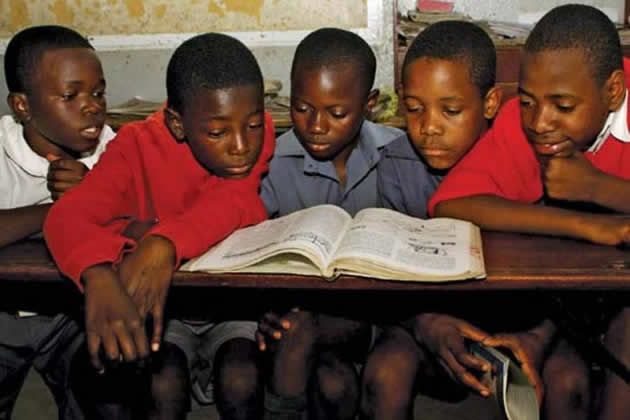Teachers pool funds to build schools


While most official schools are adequately resourced, some schools in the country are overcrowded and struggling to provide basics like textbooks
Talent Chimutambgi Review Writer
Educationists under the auspices of Innovative Teachers Organisation (ITO) are putting their money on the table as they embrace the Ministry of Primary and Secondary Education’s vision to construct 2 000 schools over the next five years.
Director of ITO, Mr Rodwell Mazhinye told The Herald Review that his organisation is set to change the teacher’s role from a passive one to an active one in determining the quality of education beyond lesson delivery and related activities. ITO held its first elective meeting in December 2014, and was formed in the same year.
Minister of Primary and Secondary Education Dr Lazarus Dokora earlier this year said that Government was looking for partners to work with in building the 2 056 schools needed.
“In 2013, we identified 2 056 places where we want to build schools. Most of these schools will be built in resettlement areas,” said Dr Dokora.
“We are trying to complement the government’s effort to build primary and secondary schools as well as vocational training centres to cater for school leavers, the less privileged and the physically challenged as well. As soon as we build vocational training centres, we will begin to enrol and students will be trained up to diploma level,” said Mr Mazhinye
He also said that his organisation is responding to President Mugabe’s call for Zimbabwe’s education system to be reoriented so as to produce citizens with practical skills and potential self-employment capacity.
“We, as educationists have been following events in Dr Dokora’s ministry with keen interest. Recently when our Honourable Minister of Education, Dr Lazarus Dokora was asked in Parliament about the shortage of schools in the country, and what he was going to do about it; he replied that the national shortage was 2 056 schools, we saw this in the Press.
At a Press Conference held in Harare recently Dr Lazarus Dokora said the Cabinet has directed the Ministry to start the construction of 100 schools before the end of the year. He said the rain season would however, delay construction and the target date for the completion of the schools has been set for March 2016.
ITO intends to complement Government’s efforts by coming in cover urban areas like new settlements and where the enrolment figures for formal schools have been overtaken by population statistics. The shortage of registered schools in urban areas has given rise to the proliferation of unregistered and unregulated institutions masquerading as “private colleges”. Earlier this month some pupils failed to sit for their public exams when it turned out that the principal of one such institution in Waterfalls, Harare had forged examination registration papers when the college was not even a Zimbabwe Examinations Council (Zimsec) accredited centre.
Mr Mazhinye said the government has already allocated ITO stands to build schools in places like Norton, Marondera, Manyame, Chinhoyi, Bindura, Chitungwiza, and Goromonzi. He said in Harare the organisation got stands in Hatcliffe, Eyrecourt, Mufakose, Marimba and Kuwadzana. He said it will take about five years to complete school building in urban areas. Members will benefit through access for their children and other dependents.
He said teachers need to empower themselves by taking ownership of their professional bases instead of relegating themselves to secondary players when they are important stakeholders.
“Lawyers have got their law firms, and doctors built their own hospitals but educationists have done nothing for the society.
“Schools built will be formal like the current government or council schools and will be quasi-government as their staffing will be through the Ministry, hence the fees charged will be fair and affordable,” said Mazhinye.
Patron of ITO Mr Edward Shumba who is also provincial education officer for Manicaland said ITO’s initiative is progressive:
“It’s a noble thing to have an organisation having interests for education of the Zimbabwean child. It is my sincere hope that we shall navigate together till the goal of quality education and quality schools is achieved,” said Mr Shumba.
Mr Mazhinye said the organisation so far has 200 subscribers who have committed to contributing $50 monthly for the next five years. The current mode of payment is through direct payment into the organisation’s accounts with other modes of payments like stop orders to be introduced in due course. Issues of governance and misappropriation of money have dogged most teacher organisations with members accusing leadership of self-aggrandisement at the expense of the contributing members.
Mr Joshua Tawonga a headmaster at Chipashu School in Mhondoro, asked Mr Mazhinye at an ITO general meeting held on Saturday in Harare to elaborate how potential members can be assured that the money invested is safe and will not be diverted to personal use. Mazhinye said there are measures in place to ensure transparency and accountability.
“There will be a team of auditors supervising the purchasing of building materials. Again there will be serious auditing to counter fraud,” he said.
Mr Mazhinye said ITO is a non-political organisation which is intending to be a driving force to the society through inviting practicing and non-practicing educationists like His Excellence President Robert Mugabe, Professor Jonathan Moyo, Cde Ignitius Chombo, and many more. He said the ITO also caters for school leavers, the physically challenged, and the less privileged as one of the core goals is to train marginalised demographic groups to become active participants in the socio-economic pulse of the country.
“May I consolidate the difference between us and other unions, which represent teachers by pointing out that these unions mainly focus on dealing with practising teacher’s rights and conditions of service only, unlike us we deal with non-practising educationists, the retired. As long you are a holder of a qualification in education, you are welcome. We are an empowerment vehicle and offer investment opportunities to all interested educationists
“We also deal with school leavers, orphans as well as the disabled and the vulnerable children and the provision of education for them,” said Mr Mazhinye.
Mrs Precious Gengo a teacher at Mukombami School in Goromonzi said the idea should get positive support from educationists across the country and beyond.
“We applaud educationists for coming up with noble ideas of empowering the country so that everyone despite their social and physical status will become active participants in the socio-economic sectors of the country. Education is power,” said Mrs Gengo.








Comments